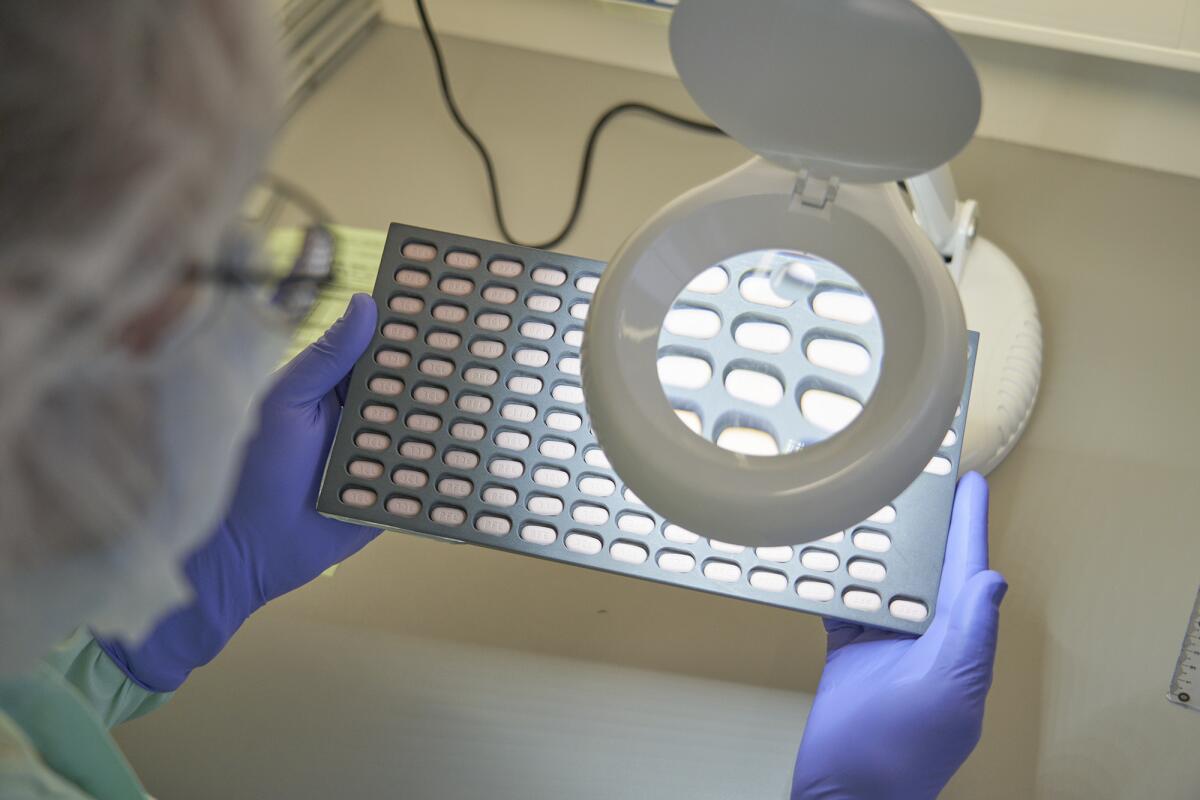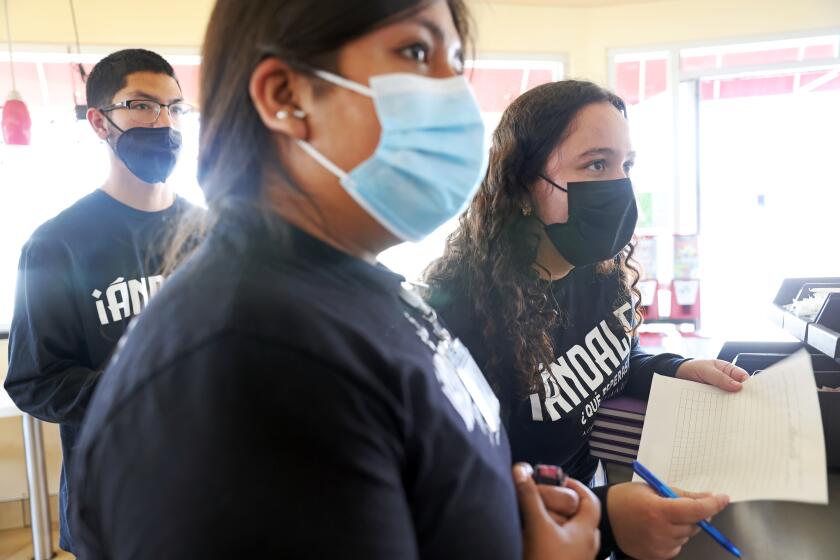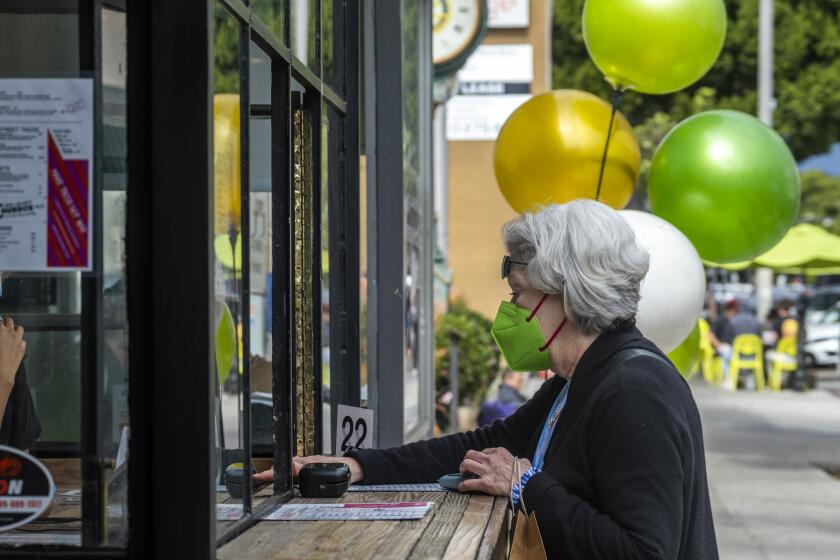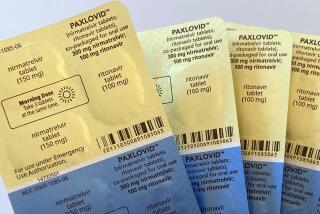L.A. County offering free anti-COVID pills to newly infected people at CVS stores

- Share via
Los Angeles County has launched the “test to treat” COVID-19 program announced by President Biden in his State of the Union address, which offers anti-COVID pills for free to newly infected people who get tested, or show their test results, at select pharmacies with on-site clinics.
In L.A. County, 20 CVS health clinics are participating in the program; a list is available on the county’s website at ph.lacounty.gov/covidmedicines or by calling (833) 540-0473. Plans are underway to expand the program to other pharmacies and clinical sites.
The antiviral pills offered in the “test to treat” program are Paxlovid, manufactured by Pfizer, and molnupiravir, made by Merck & Co., which treat mild to moderate COVID-19. The drugs must be given within a certain number of days after symptoms begin, or from the day of a positive coronavirus test, and they work best if given early, said L.A. County Public Health Director Barbara Ferrer. The drugs require a prescription.
The drug, Paxlovid, is a faster, cheaper way to treat early coronavirus infections, though initial supplies will be extremely limited.
According to federal guidelines, Paxlovid and molnupiravir are recommended for patients “at high risk of progressing to severe COVID-19,” but can be given only to those who are not so ill that they require hospitalization or supplemental oxygen treatment.
There is hope the drugs will further reduce the chance of severe illness and death among those at highest risk of complications from COVID-19. One benefit of the drugs is that they’re easier to administer than anti-COVID medications that require injections.
Paxlovid (known generically as nirmatrelvir and packaged together with a boosting agent known as ritonavir) can be given to those 12 and older who weigh at least 88 pounds. The pills are usually taken twice a day for five days.
Molnupiravir is for adults, is not recommended for use during pregnancy and is recommended only if other treatment medications are not available, Ferrer said.
Ferrer said she’s concerned that many people are unaware of anti-COVID drugs. While supplies of most are limited in some parts of the county, there also is low demand for these treatments.
“We are concerned that residents may be confused about what medications are available and how to access these drugs,” she said.
“If you think you may be a candidate for one of these treatments, please ask your provider if you’re eligible,” Ferrer said. “If you don’t have a provider, request an appointment from a clinic that’s part of the network of providers that are offering these therapeutics.” Once a prescription is granted, patients can get the pills at an approved pharmacy.
In a briefing to the California Medical Assn., State Epidemiologist Dr. Erica Pan also urged doctors to be aware of these drugs and prescribe them to patients who test positive and are at higher risk of being hospitalized.
The treatments are not a substitute for vaccinations, officials say, but are intended to provide additional protection.
The county still needs to be prepared for worst-case scenarios, officials said.
Anti-COVID drugs that are given intravenously are not part of the “test to treat” program, but Ferrer also highlighted them to increase awareness.
Two of the drugs are in a class of medications called monoclonal antibodies: sotrovimab and bebtelovimab.
Sotrovimab is used to treat COVID-19 in high-risk patients ages 12 and older who aren’t hospitalized and have mild to moderate symptoms. The drug needs to be injected slowly into a vein by a doctor or nurse over half an hour, and needs to be given as a one-time dose as soon as possible after a positive test and within 10 days after the onset of symptoms.
Bebtelovimab is for use in people 12 and older who have tested positive for the coronavirus, are at high risk and for whom other treatment options are not available or appropriate. It also needs to be given by injection over at least 30 minutes.
For the record:
10:52 p.m. May 2, 2022This article says bebtelovimab needs to be given by injection over at least 30 minutes. The correct length of time is 30 seconds.
Another anti-COVID drug — remdesivir — is given intravenously, but it is in the class of medications known as antivirals.
Remdesivir is administered intravenously in a slow infusion over 30 minutes to two hours in a hospital. It’s the only anti-COVID drug of which there is an ample supply. For non-hospitalized patients, it’s given once a day for three days and is started within seven days of initial symptoms; for hospitalized patients with severe COVID-19, it’s typically administered once a day for five to 10 days.
Unlike the anti-COVID drugs that are available as pills, remdesivir is the only antiviral outlined by Ferrer that can be used to treat children under the age of 12, as long as they weigh at least 7.7 pounds.
Federal officials recently gave the order of preference of anti-COVID treatments for non-hospitalized people, first preferring Paxlovid, then sotrovimab, then remdesivir. If none of those therapies are available, officials suggested using either bebtelovimab or molnupiravir.
Paxlovid, sotrovimab and remdesivir are preferred based on data suggesting a “79% to 88% reduction in hospitalization or death in treated patients in randomized, placebo-controlled trials, as well as on the agents’ in vitro activities against the Omicron” variant, according to a statement posted on the website of the National Institutes of Health.
Ferrer also sought to promote awareness of Evusheld (also known as tixagevimab and cilgavimab). Unlike the other anti-COVID drugs, Evusheld isn’t given to people who have already tested positive but is used to prevent COVID-19 caused by a future coronavirus exposure.
Evusheld is administered through a pair of injections — given in a single sitting — for those 12 and older. It’s intended to prevent COVID-19 among people who haven’t been exposed to the coronavirus, and either have a weakened immune system because of a medical condition or cannot get vaccinated for medical reasons.
Ferrer said residents who think they’re eligible for intravenous anti-COVID drugs should talk to their healthcare provider.
Ferrer said once there’s an ample supply of anti-COVID drugs, “there will be a vast network of providers that can provide both information and prescribe COVID-19 therapeutics, particularly in those communities with residents at elevated risk of poor COVID-19 outcomes.”
Some doctors and public health experts are continuing to take COVID-19 precautions that go above and beyond the new minimum mandates.
The L.A. County Department of Public Health will soon be launching a pilot project aimed at providing a telehealth option for patients who can’t access healthcare elsewhere or are uninsured. Because the anti-COVID drugs require a prescription, newly infected patients will need access to a healthcare provider to get those drugs.
“Patients testing positive at selected testing sites in underserved communities will be linked to this telehealth option, and again, if eligible, and if approved by a provider, they will be shipped medications at no cost,” Ferrer said.
The medications are supposed to be free, but Ferrer said she has heard of instances in which the treating facility may charge for administering a drug. She urged patients to confirm costs ahead of time with healthcare providers or insurance companies to make sure they’re not charged.
“Residents who want to learn if they’re eligible for treatment, access to these medicines or you just have questions on what would be right for you, you should either contact your medical provider or ... our information line,” Ferrer said.
More to Read
Sign up for Essential California
The most important California stories and recommendations in your inbox every morning.
You may occasionally receive promotional content from the Los Angeles Times.















